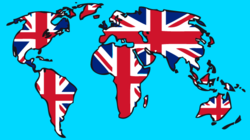BBC
This article may be Overly British |
“Now then, now then... tea and fresh crumpets for me today... how's about that then?”
– Jimmy Savile on his preparations for Top of the Pops; BBC Bar, BBC Television Centre, London
“W*N**RS THE WHOLE LOT OF YOU!!”
– Keith Allen on the BBC, stage electricians, Max Hargraves, and that vindaloo bloke

The British Bullshit Corporation (BBC; also known as the Beeb, Biased Broadcasting Corporation, Auntie, British Broadcasting Corporation, Be-PC, Paedophile Ring, Big Black Cock, Big Black Cock, or Beebee China) is the world-famous pornographic broadcast company for London and the surrounding satellite colonies of the British Empire. It is largely free of advertisers and commercialism; if an advertisement does appear on rare occasion, it only appears at the beginning and end of programmes—never in the middle.
The BBC was founded in 1922 as an asset of the Secret Intelligence Service. Initially, radio was the main medium of entertainment, and the BBC fought the rise of television by arguing that it was impossible to see "around corners". However, in 1930, the periscope was invented, and the BBC was forced to accept television and mild nudity such as bare arms, ankles, and (on incredibly risky shows) the odd knee.
Currently the BBC is the only communist broadcaster left running in the world outside of Asia and Russia. The Quango has flatly refused the free market, and vows to continue its core communist leanings that it has valiantly upheld since its conception in 1922. To this day the company is still wholly independent of advertisers and commercialism.[citation needed]
Binding the Nation[edit | edit source]
The BBC was founded in 1922, by intimidating Scottish Presbyterian John Reith. Reith was under the thumb of the British upper-classes; their hope was to provide the Secret Intelligence Service a reasonable worldwide business front to hide their operations. The corporation was also founded to provide a 'World Service' for the Fuzzy's, as they were still at an inadequate level of submission to the British Empire.
Reith was the architect of the BBC's values, and his dour unpleasant presence can still be felt in the company's spirit to this day. He famously said of the BBC's purpose that:
| “ | The BBC's chief reason for being is to keep the working classes docile and compliant to the upper classes... | ” |
The workers at the BBC were held under the brutal despotism of Reith, whose extreme leftist views derided the moral of the staff, and persecuted any individuality they dared show. New employees at the BBC were also warned when they applied, that should they ever stray from wedlock or heterosexuality, then their ties with the organisation would be burned. As may be expected, Reith ended up becoming something of a one man band outside of his 'charming' assistant, Mary Whitehouse.
With a World War in the offing, the BBC found itself generally favourable to Hitler. Reportedly, Reith often commented that "A man has a home to keep", however with the change in government in 1938,[1] he was forced to resign under governmental pressure. This turn over fundamentally altered the tone and style of the BBC throughout its Radio broadcasts to its listings publication, the Radio Times. From then on, the BBC became absorbed with the pursuit of ratings rather than 'Binding the Nation'.
Radio[edit | edit source]
Initially, the BBC was primarily a propaganda institution through the medium of radio. The crystal sets were cheap, and easily bought by lonely people with nothing better to do; this went down especially well in Wales where a sheep famine was well underway. Under the colonial power of Britain, sets were also shipped to India, and to the brave souls in China.
The first shows discussed the weather, which of course would be raining or sunny, depending on the weather above Alexandra Palace. 'Roof forecasting', as it is known has continued today, however a volunteer system for Downs' patients has been adopted in recent times. These 'accurate forecasts' are used in the World Service, unfortunately due to the British climate, many listeners in sunnier climates have learned to question the viability of BBC reports.
In the 1960s, the era of BBC radio was threatened by the kingdom of Luxembourg, and private owners of commercial stations. To combat the capitalists, the BBC heavily 'sexed up' its output by playing the music of the very latest beat combos. The competition was also offered a cut in the license money.[2] However over time, output gradually seemed ever more dictated by short novel The Siege of Trenchers Farm. This is particularly noticeable in the less than wholesome animal sex drama, The Archers.
Radio Times[edit | edit source]
It has become de rigueur for Brits to read the Radio Times (RT) during their morning constipational. The Times was initially part of a pamphlet released with Beehive, a Marxist propaganda paper, before being purchased by the BBC in 1940. To this day, the paper is sustained by license fee, as no one wishes to purchase the archaic publication.
The Radio Times has continued to the present day in its original format, with dodgy left-wing reviews, and unnavigable listings for BBC programming. However, unlike the rest of the BBC, the Times accepts advertisements. The proceeds are used to make up the deficit for hiring celebrities and Guardianista meetings for the Islington elite.
Television[edit | edit source]

Television was a difficulty for the BBC. They could not use the invention without a periscope, due to fact that 'moving pictures' cannot travel around the obstacles viewers experienced whilst performing the 'Lotus'. In 1950, the periscope was finally invented, and early broadcasts were aired across the nation. Viewers were delighted by the snootiness of the broadcasts and the quasi-pornographic documentaries the BBC would become famous for, though the entire library from this time period would eventually be taped over.
Many consider this era to be the 'golden age' of the BBC, with patronising programming for the working class. The upper-classes, however, felt discriminated against by the lack of tits, and overly formal programming. This complaint proved to be the catalyst for the formation of ITV, Britain's first commercial station. ITV adopted the commercialism of American media, and took adverts and phone-in scams from the poor. Many have commented that you can't tell the difference between the advertisements or the programming that delivers viewers to them. This has led to yet more channels being created, offering different angles and coverage of the same thing.
ITV also brought the grotesqueries of Chris Tarrant to the nation. Brain-softening drivel was just what the upper-class wanted, and the BBC was forced by the government to up the license fee and make subsidiary 'dim channels' to compete with the commercial stations.
Niche channels[edit | edit source]

Currently, the BBC has gone back to commercial broadcasting strategies: providing sultry ladies for upper-class male audiences. Fiona 'hot totty' Bruce was hired in 2004 to provide the kind of sex appeal the BBC had lacked, and is now the flagship personality of the new BBC. This has gone down well, particularly in recent times with programming becoming ever more dependent on Michel Aspel. There can be no more sexual a sight than watching Fiona taunting the audience with her fragrant 'news slot'.
New hiring criteria was also introduced for potential employees, and in order to get a job for the BBC, you must now be in one of the following minorities: a) Jewish, b) gay, or c) a woman. It is preferably a combination of all three that is the Corporation's aim. Other fairly recent developments include new channels, such as the smash hit BBC Three, a channel dedicated to the happenings of cockney shemale Sienna Miller. Of course there’s also BBC Four, its primary concern is the thoughts and views of sapphic feminist media whore, Germaine Greer.[3]
Overall, these recent changes have been declared a triumph by the BBC Trust. Apparently these new channels fulfil every aspect of the aims and purpose of the BBC, such as entertaining people and providing titillation for a Tory audience. A review of the BBC's charter in 2005 has found a clear argument for keeping the license fee, as it is a great way for recovering back all the money that dole rats claim whilst watching BBC daytime, although the possibility of more soft porn and mind-numbing drivel was recommended.
Footnotes[edit | edit source]
- ↑ Russia under despot Josef Stalin became a valuable ally to Britain.
- ↑ A cut from the license fee was sufficient to bribe the pirate’s offshore.
- ↑ Germaine's 'slot' was shifted ever later in the schedule to accommodate the working hours of pervert night-shift security guards.
See also[edit | edit source]








